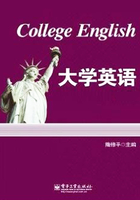
Unit One LIFE
Section A
TEXT

Nothing to sell and nothing to buy
It has been said that everyone lives by selling something. In the light of this statement, teachers live by selling knowledge, philosophers by selling wisdom and priests by selling spiritual comfort. Though it may be possible to measure the value of material goods in terms of money, it is extremely difficult to estimate the true value of the services which people perform for us. There are times when we would willingly give everything we possess to save our lives, yet we might grudge paying a surgeon a high fee for offering us precisely this service. The conditions of society are such that skills have to be paid for in the same way that goods are paid for at a shop. Everyone has something to sell.
Tramps seem to be the only exception to this general rule. Beggars almost sell themselves as human beings to arouse the pity of passers-by. But real tramps are not beggars. They have nothing to sell and require nothing from others. In seeking independence, they do not sacrifice their human dignity. A tramp may ask you for money, but he will never ask you to feel sorry for him. He has deliberately chosen to lead the life he leads and is fully aware of the consequences. He may never be sure where the next meal is coming from, but he is free from the thousands of anxieties which afflict other people. His few material possessions make it possible for him to move from place to place with ease. By having to sleep in the open, he gets far closer to the world of nature than most of us ever do. He may hunt, beg, or steal occasionally to keep himself alive; he may even, in times of real need, do a little work; but he will never sacrifice his freedom. We often speak of tramps with contempt and put them in the same class as beggars, but how many of us can honestly say that we have not felt a little envious of their simple way of life and their freedom from care?
QUESTIONS
1.What is the most important thing for a tramp?
2.Which of the two is it easier to estimate in terms of money: the value of material goods or the value of services?
3.How do beggars arouse the pity of passers-by?
4.How do tramps differ from beggars?
NEW WORDS
philosopher [fi'l6s3f3] n. 哲学家
wisdom ['wizd3m] n. 智慧
priest [pri:st] n. 牧师
spiritual ['spiritju3l] a. 精神上的
grudge [gr2d=] v. 不愿给,舍不得给
surgeon ['s3:d=3n] n. 外科大夫
passer-by n. 过路人(复数passers-by)
dignity ['digniti] n. 尊严
deliberately [di'lib3ritli] ad. 故意地
consequence ['k6nsikw3ns] n. 后果,结果
afflict [3'flikt] v. 使苦恼,折磨
ease [i:z] n. 容易
nature ['neit73] n. 大自然
contempt [k3n'tempt] n. 蔑视
envious ['envi3s] a. 嫉妒的
PHRASES&EXPRESSIONS
in the light of 根据
in terms of 根据;在某方面
envious of 嫉妒
NOTES TO THE TEXT
1.It has been said that = it is said that 据说
2.In the light of this statement, teachers live by selling knowledge, philosophers by selling wisdom and priests by selling spiritual comfort. 根据这种说法,教师靠售卖知识为生,哲学家靠售卖智慧为生,牧师靠售卖精神安慰为生。
in the light of = according to, taking into account 根据,考虑到
live by: to make enough money to feed oneself 依靠某种职业为生
3.There are times when we would willingly give everything we possess to save our lives …有时,我们为了挽救生命,愿意付出我们所拥有的一切。there are times when 有时
4.In seeking independence, they do not sacrifice their human dignity. 在追求独立自由的同时,他们并不牺牲个人的尊严。
5.He may hunt, beg, or steal occasionally to keep himself alive; he may even, in times of real need, do a little work; but he will never sacrifice his freedom. 为了生存,他可能会去打猎、乞讨,偶尔偷上一两回;确实需要的时候,他甚至可能干一点儿活,但他决不会牺牲自由。
EXERCISES
Vocabulary Exercises
Choose the best answer which is similar to the following underlined word .
1.The punishment for making false statements to the tax officers can be severe.
A) speeches
B) expressions
C) presentations
D) talk
2.If you do not come willingly, I shall have to use force.
A) quickly
B) voluntarily
C) fairly
D) promptly
3.His cruel master grudged him even the food that he ate.
A) sent
B) cut short
C) held on
D) hated
4.It is a characteristic of wisdom not to do desperate things.
A) knowledge
B) science
C) sense
D) brightness
5.I began to acquire confidence.
A) again
B) get
C) gain
D) keep
6.The First World War had far-reaching consequence in all the capitalist countries of new world.
A) effect
B) source
C) position
D) origin
7.I wish you would not afflict me with your constant complaints.
A) annoy
B) surprise
C) delight
D) relieve
8.These events aroused intense excitement throughout Europe.
A) calmed
B) rose
C) earned
D) raised
Phrase Exercises
Fill in the blanks with the phrases given below. Change the form where necessary.
live by
be aware of
in terms of
keep...from
envious of
have nothing to do with
free from
sorry for
in the light of
grudge buying
1.Chiles Dickens was the first author in English literature who completely_______writing.
2.______ what you told me I shall act in a different way?
3.As for Latin American generally, there is no reason why, ______ available resources, it can’t become a highly industrialized area.
4.It was several minutes before I _______ what was happening.
5.Mum advised me to _______that bad person.
6.He ______ drinks for people who earns twice as much as he does.
7.They had done it out of kindness, because they were ______ the poor.
8.The newspaper refused to ______ the facts _______ the public.
9.______ her friends’ success she was always ready to humiliate(羞辱)them.
10.Keep the table _______ dirt by putting a cover on it.
Translation
Translate the following sentences into English.
1.他愿意帮助他周围的人。
2.他面临两种选择——死亡或者投降。
3.人们普遍认为公共汽车司机应对乘客的安全负责。
4.她丈夫平安地回来了,她总算解除了忧虑。
5.他神经紧张,对任何响动都很警觉。